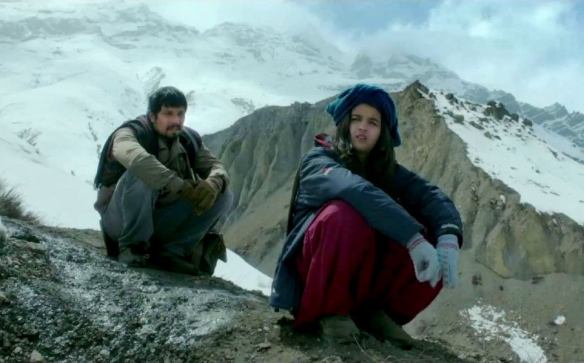If I had listened to initial reviews I would have made a U-turn on Highway and x-ed out the best Indian film I have seen for a long time! Anyone I talked to had apparently a problem with the anticipated May-December love between Alia Bhatt and Randeep Hooda. I am not so keen on those stark seasonal discrepancies either, but once you watch the movie you will understand that this isn’t your gardenvariety romance.
Soon-to-be-wed Veera (brilliantly acted by Alia Bhatt, who’s instantly moved to the top of my favorite new female actors list), born into wealth and status, is nursing deep wounds from a past she is trying to suppress. She pledges with her fiancee to elope and settle for a simple life style, where she imagines herself being a wife who lives very modestly amidst nature, cooking with devotion a simple meal for her husband.
Beware what you wish for! How so often in life, our dreams sometimes get fulfilled with an unexpected twist. Being, she gets the chance to live that way for a short period of time and under circumstances neither desired or imagined. She is being kidnapped right off the spot, being at the wrong time in the wrong place. A gas station in the suburbs of Delhi is just getting robbed, she becomes the hostage. This wasn’t planned, neither by her or by her kidnapper Mahabir (Randeep Hooda), who finds himself in the situation of needing to escape fast.. Randeep gives a powerful performance as the illiterate and simple bandit, victimized himself by an abusive father. Little we learn about his circumstances, but enough to understand his plight in a life of hardship and violence.
So, everybody who has seen the movie is trying to rationalize the strange bond of these two main characters, who are thrown at each other randomly, and call it Stockholm syndrome. Veera, the captive and the criminal Mahabir, who didn’t realize that he had abducted a high profile family girl and now runs for his life, with her in tow. Luckily for us, the journey takes us through the magnificent landscapes and villages of Rajasthan, Punjab, Kashmir. We travel with them on one of the colorful, poetically run-down trucks you can ONLY find in India. I myself don’t want the journey to end, immersed in those awe inspiring landscapes, rugged snow-covered mountains.
After a first failed attempt to escape her kidnappers, Veera resigns herself. She realizes that her captors are at the end just some poor wretched souls. except for one, who leaves very fast after waiting for an opportune moment to rape Veera but gets caught by Mahadir in the nick of time.
She experiences a sense of safety in Mahadir’s presence. charming your captor is a common survival technique. Maybe that’s what she is trying to do in the beginning. She teases, and laughs, and bounces around, uninhibited. Mahadir is unable to read this complex human being. It’s beyond him that she ceases to be afraid. He is a one dimensional thinker. Everything is either black or white in his world, until Veera starts disassembling him, piece by piece. Layer by layer. As she starts revealing to him what man has done to her, and not just man, but family. Not just incest but cover-up, abandonment, Mahadir starts realizing that pain and suffering isn’t class-bound. It’s a difficult concept for him to understand maybe. For him life is a struggle between the rich and the poor. He resents wealth on existential grounds. Initially she is just a problem he needs to solve fast. As she is opening up to him he gradually becomes her protector.
She comes to realize that the dangers and demons lived in her midst, and those perceived outside her world, were actually kinder and protective of her than her own family ever was.
As for the so called romance in this movie, her kidnapper Mahadir could have been hundred years old and have a wooden leg! Mahadir was the first person Veera ever confided to (besides her mother, who in her learned helplessness was unable to perform her motherly duty in protecting her child, for whatever reasons). And that should be a movie in itself! Mahadir never crosses the line of decency and it redeems him, not that it erases his own past, but he discovers his humanity through Veera.
This movie is all about healing, how to survive and move past violence and insults and biases. It touches you deep in your soul. The ending is the only appropriate ending one can think of. So the movie leaves you with a soft smile and tears in your eyes.
I cannot say enough about the heartfelt performances of both Alia Bhatt, as well as Randeep Hooda. I always liked him a lot, but I never realized what kind of an acting caliber he possesses, after seeing him in more commercial films that made him only look cool and sexy in a rugged way.
Imitiaz Ali, what can I say, he has done it again! Rockstar, Jab We Met, Socha Na Tha, Ahista Ahista..These are some of my alltime favorite Indian movies. He is a genius! :-)
Last not least, a word about the supporting cast. Often in Indian films, supporting cast members are not given much attention and hate to say it, but often they tend to be really bad. There was a nice balance in this movie. No one ruined it. :-) Kudos to Durgesh Kumar, Pradeep Nagar, and Saharsh Kumar Shukla.
Music. Not too much, not too little. A.R. Rahman. How can you go wrong? I loved the soundtrack and will definitely buy it.
This movie is a rare gem. It is deep as it is beautiful. The images and emotions it evokes are haunting. It resonates just on every level. The characters linger with you for a long long time.




